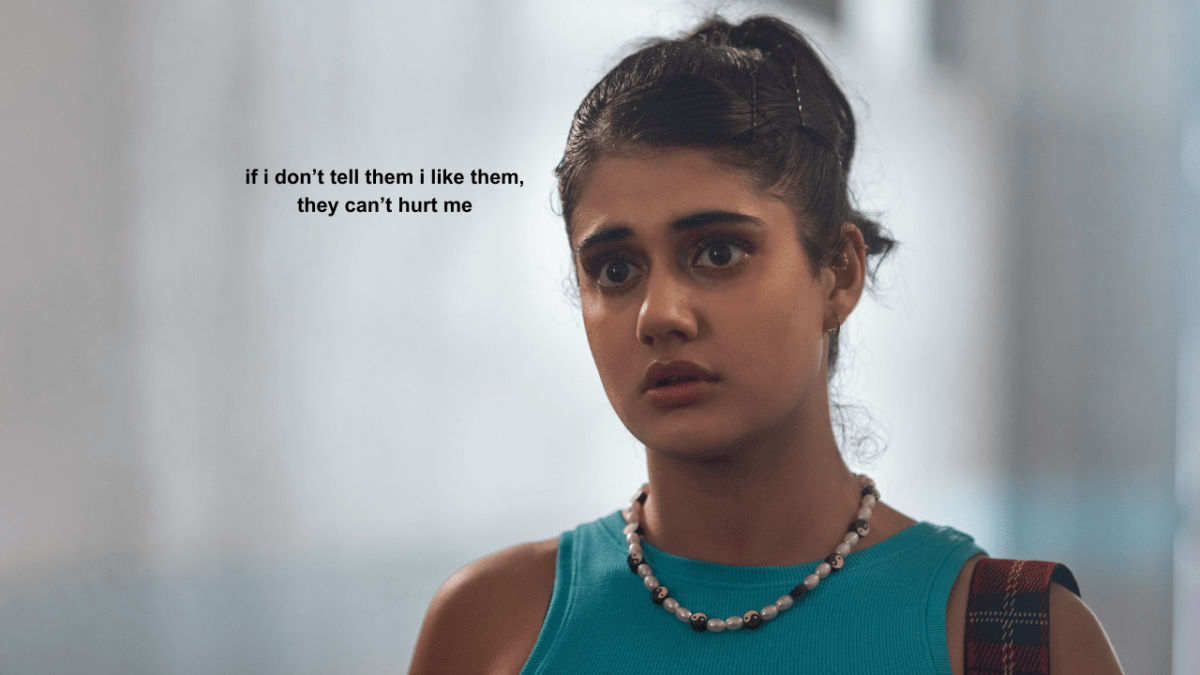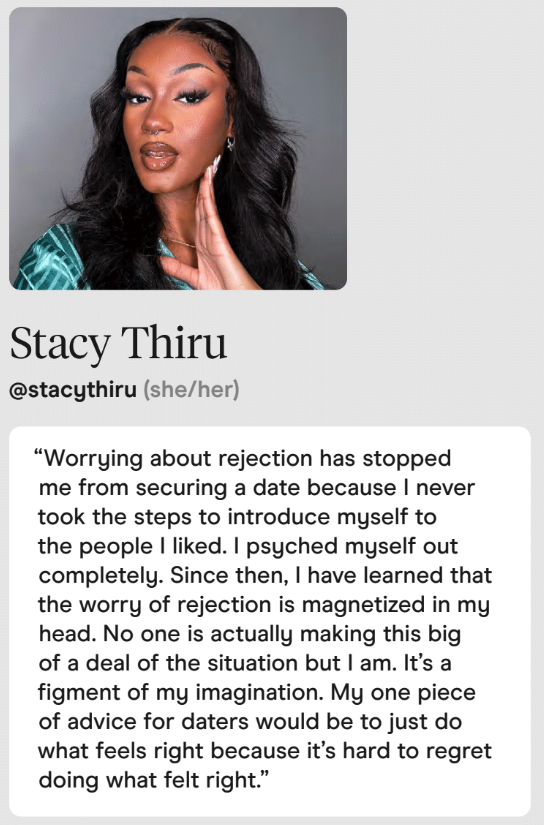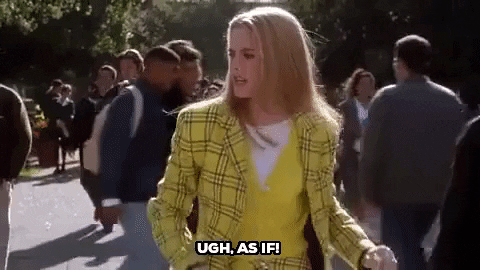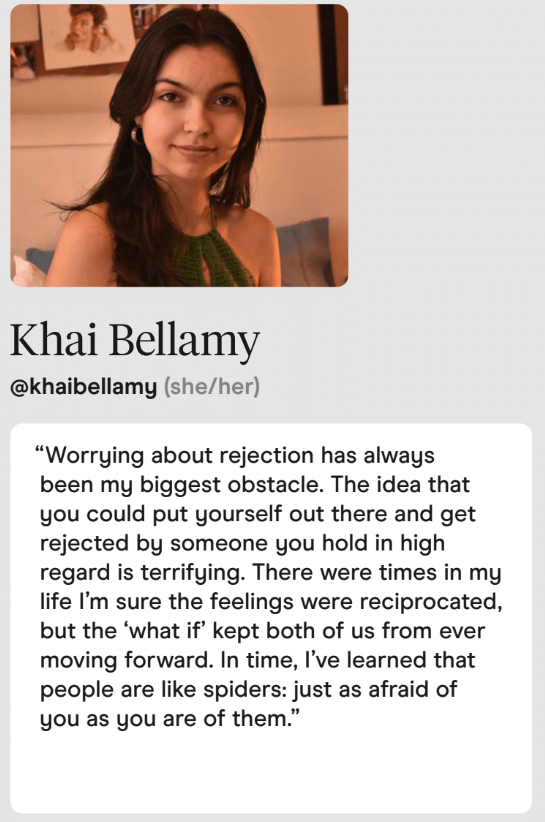
A new report has revealed that Gen Z in particular struggles with a serious fear of rejection when dating, with young people so worried about potentially coming off as “cringe” that they’re actually sabotaging their own relationships.
Gen Z are, perhaps surprisingly, a romantic bunch.
Hinge’s 2024 DATE (Data, Advice, Trends, and Expertise) report found Gen Z daters are 30% more likely than Millennials to believe they only have one soulmate, and 39% more likely to consider themselves romantically idealistic.
But, at the same time, 44% of Gen Z daters have little-to-no dating experience — and 56% of Gen Z Hinge daters admit a fear of being rejected has stopped them from pursuing a potential relationship.
When you combine those stats, they paint a pretty gloomy picture of people yearning for connection but being too scared to actually pursue it lest they be considered “cringe”. So, we try to play it cool instead.
This obsession with aloofness (hello cool girl aesthetic) that is becoming so pervasive among Gen Zs like myself is troubling because it’s messing with our ability to put ourselves out there and be vulnerable — which, I’m sorry to say, is necessary if we want to actually build meaningful, loving connections with people. (And not just cry over TikTok edits.)

But, before we get to the solution, we need to break down the source of the problem.
According to Hinge, there’s a lot of “indirect communication” happening on dating apps: think emojis, the amount of time you take to respond to a message from a match, if you even respond at all, and how many questions you ask. In the Hinge report, this is called “digital body language” or DBL.
DBL is a way that everyone — not just us young ‘uns — communicate on dating apps, and it’s an important part of gauging the vibes of another person. However, things can get messy when we rely solely on these indirect communications to express our feelings, instead of just saying what we mean outright.
So, you know, dropping hints via jokes, memes or emojis instead of just telling someone you have feelings for them. We’ve all been guilty of it.
It seems Gen Z in particular can lean on DBL as a crutch, causing us to a) overthink things like the time between messages being sent or what a specific comment means, and b) avoid being open about how we feel, in case we’ve misread the situation.

So, how can Gen Z combat this fear of being cringe and really open up?
Licensed therapist and Hinge’s Love & Connection Expert Moe Ari Brown (he/they) has some sage advice for Gen Z daters on how to “embrace the cringe” — which, I promise, is less cringe than it sounds.
“I believe everybody is looking for the same three things primarily: belonging, authenticity and love,” Moe told PEDESTRIAN.TV.
“Every human is also capable of worrying about whether or not they’re going to be able to find those things. What I do think is specific to Gen Z, is this reputation that you all have for playing it cool in response to that worry.”
The first step to overcoming our fear of being cringe — and just being ourselves — is to understand that being freaked out by potential rejection is normal. It’s a self-protective reflex. But experiencing rejection is normal, too, and it’s only through this process of trial and error that the right person will be found.
“I’m often inviting people to shift from focusing on the fear, or the cringe that’s coming up, [to focus] on courage,” Moe suggested.
“Because courage is a lot more valuable to us in this context. It helps us to really overcome the anxiety and the worry. That fight or flight response is telling us to run [but] we don’t really need that mechanism.”

Of course, building up “rejection resilience” is easier said than done. But it’s not impossible, and there’s some steps you can take to adjust your perspective and give yourself the boost of courage you need to chase what you want.
“Focus on the kind of relationship that you want to build,” Moe advised.
“Fear often [causes] us to think in ‘what if’. Like, ‘what if something bad happens?’ ‘What if I get rejected?’ ‘What if they don’t like me?’ But courage causes us to think in possibilities. We’re focused on the possibility of what we could create. So if we shift to focusing in on the vision or the dreams or the fantasies we have about relationships, we’re able to then cultivate them in an easier way.”
Moe also issued the important (and affirming) reminder that as Gen Z, we have more access to emotional support and therapy than our previous generations — so we’re more capable than we think.
“Your generation is marked by some really great skills as a foundation,” he said.
“So the rejection resilience really will come from first acknowledging what that fear is trying to tell you.
“Fear is often just a symptom of something else. It’s popping up to tell us hey, something is off or misaligned… So when we listen to that fear, then we’re able to embrace it, embrace the cringe, because there are so many important messages that come along with it.”
2024 out: cringe. 2024 in: wearing your emotions on your sleeve and shamelessly caring about people because really, isn’t that what life is all about?



